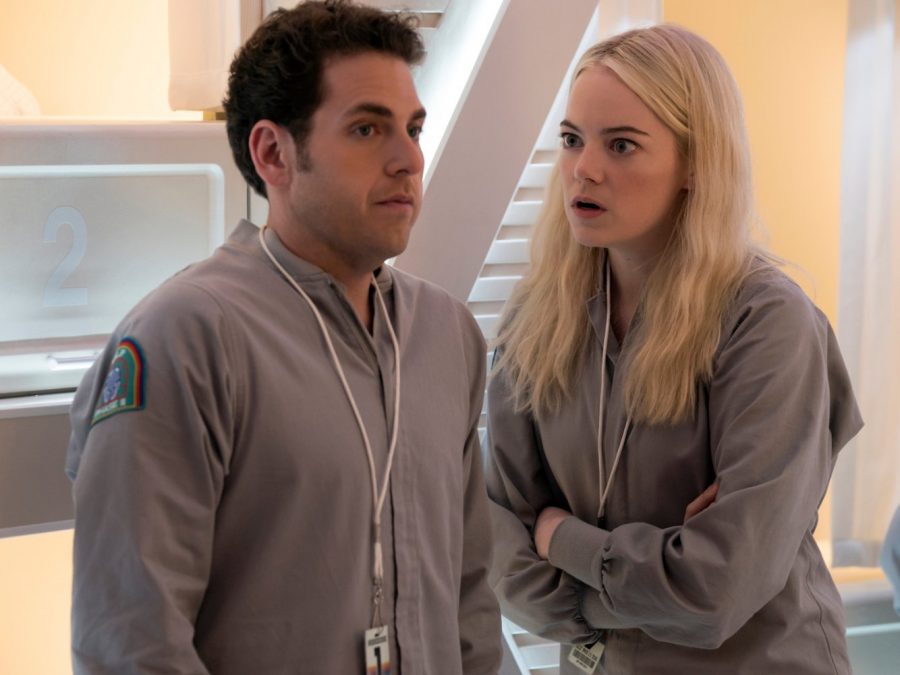During the second episode of Netflix’s “Maniac,” an exasperated Annie (Emma Stone) meets up with a drug dealer in Washington Square Park to beg him for more pills. An NYU flag waves in the background as the two bicker, sitting side-by-side at a chess table where the dealer plays against a purple animatronic koala. Distracted, he loses the match along with his $100 bet, and the koala grunts, “What’s yours is mine now, b-tch!” I chuckled, then yawned. And then the show moves on.
It’s moments like these, small and idiosyncratic, that function as the nexus of the limited series’ dystopian version of New York City. Directed by Cary Joji Fukunaga and created by novelist Patrick Somerville, “Maniac” offers up a world in which people pay for subway fares with a service that pairs you with an AdBuddy, a person who follows you verbally reciting ads, and where the Statue of Liberty sits across from a twisted facsimile, the Statue of Extra Liberty. It’s all very bizarre, yet, just as quickly as the show intrigues you, it falls flat as a confusing attempt at recycled ideas. The purple koala from the beginning serves as nothing more than a kind of metaphor for how the show is set up: an overly flashy automaton made solely to impress you and to hide its helter-skelter foundation.
Its failure is due, in part, to how it was constructed. The show is too calculated and heavy-handed for something that purports to be trippy and unpredictable. It centers around depressed schizophrenic Owen Milgrim (Jonah Hill) who buckles under the pressures of his well-to-do family and finds refuge in Annie, a tortured drug addict whose addiction worsens from, ironically, her lack of family. They cutely meet in a pharmaceutical trial conducted by Neberdine Pharmaceutical Biotech, where they undergo a series of experiments for a new drug that’s meant to eliminate sadness and pain. The experiment, headed by the neurotic Dr. Mantleray (Justin Theroux) doesn’t go according to plan, and after the third episode the series mainly follows their drug-induced hallucinations, intended to mimic movie genres from high fantasy to 1940s noir.
It’s an interesting premise, but it becomes increasingly clear as each episode passes that the show is less concerned with its characters or plot than it is with keeping viewers glued to the screen, making sure you click to load the next episode before the credits even begin to roll.
“Because Netflix is a data company, they know exactly how their viewers watch things. So they can look at something you’re writing and say, We know based on our data that if you do this, we will lose this many viewers,” explained Fukunaga in an interview with GQ. “So the question is: do we want to make a creative decision at the risk of losing people?”
Hollywood is subservient to whims of the culture it creates. It feeds on views and subscriptions and Emmys and retweets. I’ll be the first to admit that my attention span is as short as a gnat’s. But letting viewer data inform the artistic process is a dangerous game, and “Maniac” suffers from its bingeablility. Serialized television simply doesn’t work in every format, and it goes without saying that shows as ambitious as “Maniac,” with all its quasi-existential preoccupations, should not be consumed in the same way as, for instance, The CW’s “Riverdale.”
The show also falls on its face due to its casting. One would think that after veritable masterwork “Superbad,” Hill and Stone would already have a dynamic that shines. Yet, their chemistry is nonexistent. Owen’s plaintive, Eeyore-esque demeanor eats up any room for characterization and contradicts the show’s attempt to portray the complexity of mental illness. Meanwhile, Annie’s tragic backstory allows for more empathy, but her varied dream-sequence characters are so parodic that in the end the only couple I found myself rooting for was Mantleray and his chain-smoking assistant, Dr. Fujita (Sonoya Mizuno). It speaks, again, to the burgeoning formula of streamable television: big names, big money, big pay-off. But at what cost?
I’m sure this show appealed to many. It’s visually exciting, tonally ranged and every so often it’ll nudge viewers toward a kernel of truth. But even then, it can’t help but talk down to you. “Maniac” is meant to make you think about the nature of destiny, consumerist culture, addiction, technology, mental illness, friendship, trauma, consciousness and family. But ultimately, in attempting to accomplish so much it fails to say anything new. Go ahead and stream an episode or two. It might just be your cup of tea. But if you’re looking for something more substantial than a Don Quixote motif, don’t count on “Maniac.”
A version of this article appeared in the Tuesday, Oct. 9 print edition. Email Alex Wolosky at [email protected].























































































































































